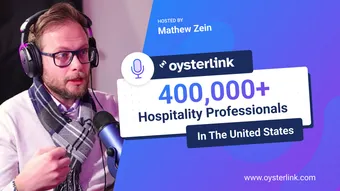Who is Sarah Diehl?
Sarah Diehl didn’t just stumble into hospitality — she discovered it through a deep curiosity about people and culture. Starting with a political science degree and an interest in how communities connect, Sarah realized food was the universal language that brought people together.
Her journey began with a bold step into the restaurant world, joining Hillstone Restaurant Group’s rigorous management program without prior experience. From there, she turned her passion for food, people and culture into a thriving career, culminating in the creation of Empowered Hospitality: a company transforming businesses by building exceptional workplace cultures.
Find out more by reading through her interview below.
How did you become a business owner?
Sarah: In late 2016, I was laid off — and that was how Empowered Hospitality started. I was interviewing a lot and meeting with a lot of small restaurant groups around the city who were looking for an HR director, and something I kept seeing over and over was groups that were recruiting for a director, but maybe didn't really need a full-time HR director, or maybe didn't really know exactly what an HR director is.
A lot of those became my early consulting projects, and my business partner said, "Hey, maybe looking for a full-time job is actually not what you should do next. Maybe you should start a consulting practice." And that was really how Empowered Hospitality was born.
Since then, we've worked with hundreds of restaurant groups. We have an amazing team of 25 full-time consultants, and it's just been an incredible journey
How do you stay healthy on the job?
Sarah: Becoming a General Manager gave me a little more control over my schedule. Not only that, but I had GMs during my career who were really thoughtful in terms of how they scheduled the team. For example, I might not have had every Saturday off, but I did get Mondays off.
This made it feel a little bit more normal and kind of gave me time to recover. So I think leveraging your schedule is one really big thing to the extent that you can and another thing I would say is fitness.
I think actually the times that I have felt the best aren't really related to how much I'm working or the physicality of my job. It's actually much more related to my fitness routine.
I always try to maintain my health in that way. And a lot of mental health comes from that as well. By just having an hour to unplug and really focus on myself, it helps bring my stress levels down.
What key skills matter most for managers?
Sarah: Manager is a very demanding role because it requires a lot of different things for one to be successful at it. One, I think — and I will say I struggled with this early in my career — is how you lead and inspire others, particularly as a younger manager just starting in your career.
Many of the employees that you might be responsible for managing are older than you and much more experienced than you. So it really clicked for me once I had learned how to tap into their experience and their knowledge and also, in return, inspired their respect by working hard myself and asking smart questions.
The second thing that is very important is organizational skills.
One thing that I had to learn as a Restaurant Manager is when an employee asks for help, you can't always say 'yes' immediately.
As a Manager, you are responsible for a very special and important set of responsibilities that only you are in charge of. So, as much as you should be supportive and you should absolutely listen and help when an employee has a challenge, you also are responsible for making sure all of your other responsibilities get done.
I would also say just being really curious and inquisitive because there are so many opportunities to grow within our industry: whether it's learning how a P&L works, how to structure a wine list or how to become a better coach and leader.
The Restaurant Managers whom I have worked with, who have been able to grow the most quickly in their careers, are people who take learning very seriously and aren't afraid to ask questions, or even ask for opportunities to take on more responsibility.
What skills do restaurants look for, and how should resumes reflect them?
Sarah: I think that a lot of the same things that make a successful manager, make a successful employee as well. Things like eagerness to learn, open-mindedness and reliability are incredibly important at a baseline. Just knowing that you're going to show up consistently and you're going to be positive, respectful and open to feedback.
And then of course, there are hard skills. And so when it comes to the resume, I think painting a full picture of all of the skills that you've developed and the impact those skills have had on your company at the time makes a lot of sense.
I like having between three and five bullet points beneath each position that says, you know, "Here's what I delivered, here's the impact that I made, here's a skill that I learned," to make it really specific and relevant so that a future employer can understand the value that you're going to bring to their organization.
How long does the hiring process take?
Sarah: Generally speaking, for an hourly position, the interview process usually takes about a week or two. Usually, two to three interviews and then maybe some kind of interactive exercise, like opening a bottle of wine or cooking a medium rare cheeseburger or something like that.
And then for Managers, it could take a little bit longer but generally, again, two to three weeks is pretty standard. I think in part because...
when we need a role in hospitality, we need it quickly — so these processes don't tend to be too drawn out, thankfully.
How can candidates spot red or green flags in interviews?
Sarah: Number one, if an employer is not respectful of you or your time, that is absolutely a red flag. As someone who's worked for years in HR, I've heard all kinds of stories. One consistent frustration with candidates is: "I showed up at my scheduled interview time, and the manager wasn't available to meet with me, or the manager kept me waiting for 30 minutes before interviewing me."
And I would just say, "You don't owe that opportunity anything." If they keep you waiting for 30 minutes, 45 minutes, it just means that you're not a priority to them. I think we should take those signals seriously and realize that if they're treating you that way as a potential employee, it will be even more extreme once you're on board with them.
How should candidates handle short-term jobs on resumes?
Sarah: Coming prepared with brief explanations that are transparent and that are objective to explain why you've left one position and moved to another is really important. If you left somewhere because it was toxic, it's okay to say that. However, you might want to be thoughtful about how you say it and blame the past employers.
That can be a red flag from a candidate's perspective. But again, just being open about it, not hiding things on your resume. Often, we’ll do reference checks and we’ll realize that maybe the dates on someone's resume don't line up. That, to me, is also a red flag because it means the person is hiding something and not being fully transparent.
So I would say — be honest, be open about why you moved from one role to the next. Make sure they're good reasons and that you explain to them that it makes sense objectively why you made that decision.
How can employers attract young talent to hospitality?
Sarah: I think our industry unfortunately has a reputation for being pretty unhealthy. It started back in the day when Anthony Bourdain was in the kitchen and all of the stories he told in his books. People thought that hospitality was about drugs, sex and angry chefs throwing pots and pans. However, thankfully, these stories are now less and less true.
We've come probably 90% of the way, but there's another 10% in terms of really caring for our employees. And that is really what Gen Z and the younger generations are looking for. They need a place where there's a clear career path, and there are resources for them to learn. On top of it, they want to feel like their needs and their desires are cared for.
How crucial is a well-written job description?
Sarah: At Empowered Hospitality, we do a lot of employee engagement surveys and one of the questions we ask about and almost always have room for improvement is: "Do you clearly understand what your responsibilities are?"
The confusion that can come from not having a clear job description can be harmful to someone's morale and their ability to grow within a company.
Having a clear job description is important. But being willing to go beyond your job description is really how you grow.
I would caution any employees who are looking at their job description as this very rigid and defined thing and saying, "Well, it's not my job, so I'm not going to do that because it's not on my job description," you're missing opportunities to expand your career.
There should be this healthy balance between providing clarity and being flexible, as our environment constantly demands adaptability.
Should job descriptions list salary ranges?
Sarah: Yes, absolutely. Actually, it's required in many states, including here in New York. So in some cases, it's not even an option.
But here's why I like this. You're going to go through the interview process with the candidate. And let's say you have not put the salary range out there for whatever reason, and you reveal it at the end of the process. The outcome is either it's what the employee was looking for and it's a happy surprise, or it is not what the employee is looking for.
And in that case, you've gotten to a point where you've wasted a lot of time and they may accept the job because they have sunk-cost bias. But I'll tell you what they're going to do — they're going to keep looking for a job that pays what they're looking to earn.
Not posting a salary range can be short-sighted. While it might attract more candidates, hiring someone below their expected range is rarely a sustainable long-term solution.
Do restaurant jobs cover living costs in NYC?
Sarah: I think that there's still a huge challenge for us in terms of the cost of living. Not only that, but if you think about where employees need to live in order to afford their lifestyle and also commute into work, I think it creates a lot of strain beyond the stress that they experience within the job environment.
Relying on public transportation or having multiple train transfers to get to work or taking a bus that's not reliable. Our industry definitely suffers from that.
In fact, a lot of our employers are thinking about not what the minimum wage is, but what is the minimum living wage.
I think it's absolutely still a challenge, especially for back-of-house roles and particularly for the kind of entry-level, junior management roles.
Why are staff leaving for better pay while employers keep rehiring?
Sarah: Let me share an anecdote from the client that we're currently working with. They're a fairly large company, multi-unit restaurant group. And when we first started working with them, they said, "Hey, we're having a real problem with turnover. We have gaps in our management teams all over the country. We don't know why. We have a great business and great values and we're still having trouble hiring."
So, we went through the process of benchmarking their management salaries against other similar businesses in their markets. And no surprise, we found out that they were paying about 10 to 20% below what their competitors were paying. After increasing the salaries, they were very quickly able to fill all of their open management positions and have since reduced the turnover rates that they were experiencing.
And there is a cost to turnover. Turnover can be anywhere from $5,000 to $10,000 for any hourly employee.
With a 70% annual turnover — an industry average — that’s substantial. If 70 employees leave at $5,000 each, the cost quickly adds up.
Just demonstrating the math, honestly, is sometimes all that's needed to really convince an employer that it makes sense to invest in paying a little bit better, retaining employees, offering benefits and doing some of the things that will keep employees around for longer.
What are today's top employer challenges?
Sarah: Every business is different, but there are some things that apply across the board. Since the pandemic, there’s been a big shift toward focusing on things like health insurance and supporting employees with workplace concerns.
Creating a sense of well-being within teams is a huge priority now. On top of that, the job market is more competitive than ever, so we’re all working to elevate the industry while dealing with some tough economic challenges.
How do we attract a great team, and how do we get them to stick around? Those are the things we're talking about a lot.
What’s your top advice for job seekers in this industry?
Sarah: Be careful and take time in your job search. Make sure you know what you're looking for. Get clear on what makes a great job environment for you before you start your interview process.
Be selective and take time. Meet with a lot of different employers. Pay attention to how they treat you in the interview and ask them questions. You are interviewing them as much as they're interviewing you and you should make sure that wherever you're going to choose to invest your time in a place that really values you and that can help you grow.






Loading comments...